Washing your face with soap may appear to be a simple and effective method of cleansing your skin, but it can have some negative side effects. Here are five reasons why you should avoid using soap to wash your face:
- Soap can strip your skin of its natural oils because it is frequently alkaline, leaving it feeling tight and dry. This may cause breakouts, inflammation, and irritation.
- The pH balance of your skin is a delicate balance of acidity and alkalinity. Your skin becomes more vulnerable to bacteria and other harmful elements when you use soap because it can upset this balance.
- Using soap can make your sensitive skin or acne-prone skin worse. Soap can irritate sensitive skin, resulting in redness and inflammation, as well as clog pores and cause acne breakouts.
- Soap can also accelerate the ageing process by causing collagen breakdown and dehydration. This may result in wrinkles, fine lines, and a dull complexion.
- Fortunately, there are lots of safe and efficient soap substitutes for cleaning your face. Think about switching to a mild facial cleanser, micellar water, or oil cleanser instead. These skincare items can effectively cleanse your skin without removing its natural oils or upsetting its pH balance.
Is Soap Good for Face Cleansing?
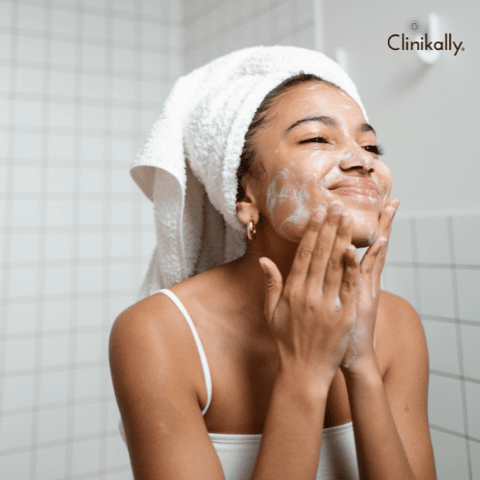
Soap is a good cleanser, but it can strip away natural oils and disrupt the delicate balance of your skin's microbiome, resulting in dryness, irritation, and breakouts. Furthermore, soap may not remove all dirt, makeup, and other impurities from your skin. Face washing is an important part of your daily skincare routine. It aids in the removal of dirt, oil, and impurities from the skin, thereby keeping it clean and healthy. However, when it comes to selecting the best product for washing your face, there are numerous options on the market, including soap.
Controversy Surrounding Soap-Based Face Wash
Soap-based face washes have sparked debate in recent years, with many people questioning whether they are beneficial or harmful to the skin. The following are some of the major points of contention:
-
Drying effect: One of the main criticisms levelled at soap-based face washes is that they can cause skin irritation and other negative effects. This is due to the fact that soap is frequently alkaline and can strip the skin of its natural oils, leaving it tight and dry.
-
pH balance: Soap-based face washes can also disrupt the skin's natural pH balance, leading to an increase in bacteria and other harmful agents. This can make the skin more susceptible to breakouts and other issues.
-
Harshness: Soap-based face washes can be drying to the skin, especially if you have sensitive or acne-prone skin. This can result in redness, inflammation, and other negative consequences.
-
Effectiveness: While soap-based face washes are frequently lauded for their ability to remove dirt, oil, and makeup, some argue that they may not be as effective as other types of cleansers, such as oil cleansers or micellar water.
Importance of Understanding Your Skin Type and pH Balance
Understanding your skin type and pH balance is essential for maintaining healthy skin. This is why:
-
Knowing your skin type can assist you in selecting the appropriate skincare products and avoiding products that may be harmful to your skin. There are four different types of skin: oily, dry, combination, and sensitive. Each skin type necessitates a unique set of products and care.
-
Your skin's pH balance refers to the balance of acidity and alkalinity. A pH of around 5.5 is ideal for the skin because it aids in the preservation of the skin's natural protective barrier. When the pH balance of the skin becomes too alkaline, it becomes more susceptible to bacteria, dryness, and other issues.
-
Understanding your skin type and pH balance can assist you in selecting the best skincare products. For example, if you have dry skin, you should use products that hydrate and moisturise the skin. If you have oily skin, you should use products that help to control oil production.
-
Understanding your skin type and pH balance can help you avoid or reduce acne, dryness, and sensitivity. Using products that are suitable for your skin type and pH balance can assist in keeping your skin healthy and radiant.
What are the Common Side Effects of Using Soap on Your Face?
There are some common negative effects of using soap on your face. Some of them are as follows:
-
Dryness and tightness: The use of soap can deplete the skin's natural oils, leaving it feeling tight, uncomfortable, and dry.
-
Inflammation and irritation: People with sensitive skin are more susceptible to these effects from soap. This can lead to redness, itching, and other uncomfortable symptoms.
-
Breakouts: For people with acne-prone skin in particular, soap can clog pores and result in breakouts. This may result in acne, blackheads, and other skin imperfections.
-
Collagen breakdown: Collagen, a protein that keeps skin firm and youthful-looking, can be broken down more quickly by soap. This can eventually cause fine lines, wrinkles, and other ageing symptoms.
-
Disruption of the skin's natural pH balance: Soap is frequently alkaline and can cause the skin's pH balance to be upset, making the skin more susceptible to bacteria and other potentially harmful substances.
Side Effects of Using Soap on Skin
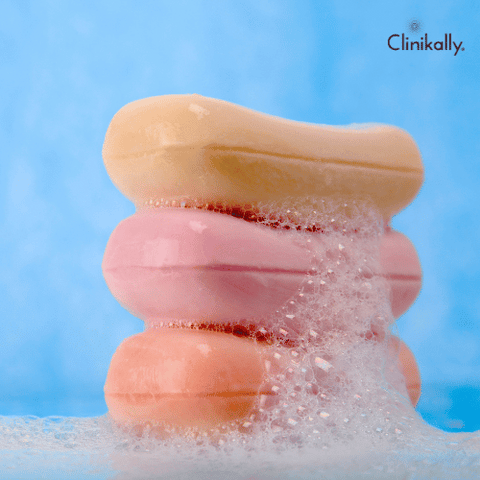
While soap can be an effective cleanser for some areas of the body, it can be harmful to your skin if used excessively or incorrectly. The following are some of the potential negative effects of soap on your skin:
-
Soap, especially if used excessively, can be drying to the skin. This can strip the skin of its natural oils, leaving it tight, dry, and uncomfortable.
-
Soap is frequently alkaline, which can upset the skin's natural pH balance. This can result in an increase in bacteria and other harmful agents on the skin, causing irritation, breakouts, and other negative consequences.
-
Soap can irritate the skin, particularly those with sensitive or allergic skin. This can cause redness, itching, and other unpleasant symptoms.
-
Soap can degrade collagen, a protein that keeps the skin firm and youthful. This can result in fine lines, wrinkles, and other signs of ageing over time.
-
Soap can remove the skin's natural protective barrier, making it vulnerable to damage and infection.
Dryness and Dehydration
Dryness and dehydration are two distinct skin conditions that are frequently confused with one another, but have distinct underlying causes and require distinct treatments. Dryness occurs when the skin lacks natural oils or lipids, which are required for the skin's moisture barrier to function properly. A variety of factors can contribute to this, including genetics, ageing, harsh soaps, and exposure to environmental irritants such as wind or cold air. Dry skin is rough, itchy, and flaky, and it is prone to fine lines and wrinkles. Dehydration, on the other hand, occurs when the skin does not have enough water or moisture. This can be caused by a number of factors, including not drinking enough water, consuming too much alcohol or caffeine, being exposed to dry or hot environments, or using harsh skincare products. Dehydrated skin can feel tight, dull, and lifeless, and it is more prone to wrinkles and fine lines.
Dryness is treated by using moisturising products that help to restore the skin's natural oils and lipids. Using a gentle cleanser, moisturising cream or lotion, and avoiding harsh or drying products that can strip the skin of its natural oils can all help. Dehydration treatment entails using products that help to restore the skin's moisture levels. Drinking more water, using a hydrating serum or moisturiser, and avoiding products containing alcohol or other drying ingredients can all help.
Irritation and Inflammation
Irritation and inflammation are two common skin reactions that can be caused by a variety of factors, such as product sensitivity, environmental irritants, allergies, and underlying skin conditions. Irritation is a skin-level reaction that causes redness, itching, and discomfort. It can be brought on by exposure to irritants like certain ingredients in skincare products, detergents, or fragrances. Over-exfoliation or aggressive scrubbing can also cause skin irritation in some cases. Inflammation, on the other hand, is a more serious reaction that can result in skin swelling, heat, and pain. It can be triggered by irritants or allergens, but eczema, rosacea, and psoriasis are frequently linked to it. The best way to prevent irritation and inflammation is to become aware of potential triggers and steer clear of them. Examples include avoiding over-exfoliation, using gentle skincare products devoid of irritating chemicals or fragrances, and protecting the skin from environmental irritants like pollution or UV rays.
Acne Breakouts and Clogged Pores
Several factors, such as excessive oil production, hormonal imbalances, and the accumulation of dead skin cells, can contribute to the development of acne breakouts and clogged pores. Whiteheads, blackheads, and pimples develop when the hair follicles in the skin become clogged with oil and dead skin cells. Hormonal imbalances, stress, and specific medications can make acne breakouts worse.
Clogged pores, also known as comedones, occur when oil and dead skin cells become trapped in the hair follicles and are unable to escape. This can result in the formation of blackheads and whiteheads, giving the skin a dull and congested appearance. To avoid acne breakouts and clogged pores, practise good skincare habits such as cleansing the skin on a regular basis to remove excess oil and dead skin cells. Aggressive exfoliants and harsh scrubs can aggravate acne and clogged pores while also irritating the skin. Aside from a good skincare routine, lifestyle factors can also help prevent acne breakouts and clogged pores. Eating a healthy diet, getting enough sleep, and managing stress can all contribute to clear, healthy skin.
Harsh Chemicals in Soap-Based Cleansers
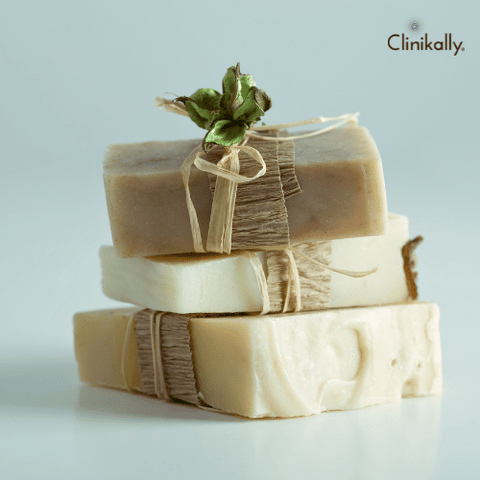
Many conventional soap-based cleansers have harsh chemicals in them that can strip the skin of its natural oils, resulting in irritation, dryness, and other skin problems. These harsh chemicals are among them:
-
Sodium lauryl sulfate (SLS) and sodium laureth sulfate (SLES): Surfactants that are commonly used in cleansers to create a lather and remove dirt and oil from the skin. They can, however, be harsh and drying, as well as irritate and strip the skin of its natural oils.
-
Parabens: These are preservatives that are commonly used in skincare products to prevent bacteria and mould growth. However, they have been linked to skin irritation and have been banned in some countries due to health concerns.
-
Synthetic fragrances: These are frequently used to add a pleasant scent to cleansers, but they can be irritating to the skin and cause allergic reactions in some people.
-
Alcohol: Alcohol, which is found in some cleansers, can be drying and irritating to the skin. It can also upset the skin's natural moisture balance, resulting in dehydration and other skin issues.
Fragrance and Artificial Additives
Fragrance and artificial additives are common ingredients in many soap-based cleansers, and they can be harmful to the skin. To give cleansers a pleasant scent, fragrances are frequently added. Many fragrances, on the other hand, contain synthetic chemicals that can irritate the skin and cause allergic reactions. Phthalates, which have been linked to hormonal disruptions and other health concerns, can also be found in fragrances.
Colours and preservatives are frequently added to cleansers to improve their appearance and extend their shelf life. These ingredients, however, can be harsh and irritate the skin. Some preservatives, such as formaldehyde-releasing agents, for example, can cause skin irritation and have been linked to health concerns. Selecting cleansers devoid of artificial additives and fragrances will help you avoid their negative effects. Look for items that are fragrance-free or have a natural fragrance made from plant or essential oil extracts. It is crucial to read ingredient labels and stay away from goods that contain abrasive or potentially harmful additives. Choose cleansers made with gentle, natural ingredients that are less likely to irritate the skin.
Risks of Overusing Antibacterial Properties
Antibacterial properties should not be used excessively, as this can damage the skin and promote the growth of antibiotic resistance. To kill bacteria and other microorganisms on the skin, antibacterial properties such as triclosan and benzalkonium chloride are frequently added to soap-based cleansers. These ingredients, however, can also kill beneficial bacteria that help to keep the skin healthy and balanced.
Excessive use of antibacterial properties can dry out and irritate the skin, as well as mess with the skin's normal microbiome. This can make the skin more susceptible to infections and other skin issues, as well as contribute to antibiotic resistance. Additionally, some studies indicate that when it comes to preventing disease or infection, antibacterial properties are no more effective than regular soap and water. Except in situations where they are absolutely necessary, like, in healthcare facilities, the Centers for Disease Control and Prevention (CDC) advise against using antibacterial products. Instead, they advise washing hands with regular soap and water.
Importance of Dermatologist Advice and Alternatives
If you have particular skin issues or conditions, consulting a dermatologist can help you maintain healthy skin. Dermatologists are doctors who specialise in the diagnosis and treatment of skin, hair, and nail problems. They can assist in determining the underlying causes of skin issues such as acne, dryness, or irritation and recommend appropriate treatments and skincare routines. If you're having skin problems or have questions about your skincare routine, it's a good idea to consult a dermatologist. They can help you identify your skin type and any underlying problems that might be the source of your problems. They can also make recommendations for products and treatments that are specifically tailored to your needs and will assist you in achieving your goals.
Alternative Options for Gentle and Effective Face Cleansing
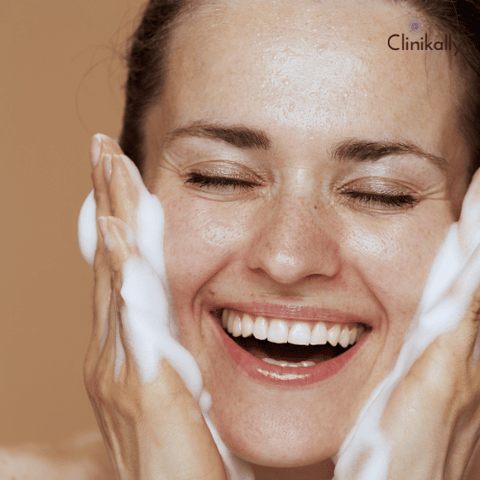
If you're looking for alternatives to traditional soap-based cleansers for gentle and effective face cleansing, there are many options available. Here are a few to think about:
-
Oil Cleansing: Oil cleansing entails gently removing dirt, makeup, and impurities from the skin with natural oils such as coconut or jojoba oil. The oils help to dissolve dirt and unclog pores while also nourishing and hydrating the skin.
-
Micellar Water: Micellar water is a mild, water-based cleanser that uses tiny micelles to take off dirt and makeup from the face without removing the skin's natural oils. It's a great option for people with sensitive skin because it's gentle and doesn't require rubbing or scrubbing.
-
Cream cleansers: Due to their gentleness and moisturising properties, cream cleansers for face are a fantastic choice for people with dry or sensitive skin. They frequently include nourishing ingredients like shea butter or aloe vera that aid in hydrating and soothing the skin while removing impurities.
-
Powder Cleansers: A more recent development in skincare, powder cleansers involve combining the powder with water to produce a mild, foaming cleanser. These cleaners are typically made from organic materials like rice bran or oatmeal and are mild enough to be used every day.
-
Cleansing Balms: Cleansing balms use natural oils to remove dirt and impurities from the skin, much like oil cleansers do. However, they are thicker in consistency and often contain additional nourishing ingredients, such as vitamin E or chamomile extract, that help to soothe and hydrate the skin.
Micellar Water and Cleansing Oils
Micellar water and cleansing oils are two popular, gentle, and effective face-cleansing options. Micellar water is a gentle, water-based cleanser with tiny micelles, or oil molecules, that attract and remove dirt, makeup, and impurities from the skin. It's an excellent choice for those who have sensitive skin because it's gentle and doesn't require any scrubbing or rubbing. Simply saturate a cotton pad with micellar water and gently wipe it over your face to remove dirt and makeup. Another gentle option for removing impurities from the skin is cleansing oils. They work by removing dirt, makeup, and impurities from the skin with natural oils such as coconut or jojoba oil. Cleaning oils, unlike traditional soap-based cleansers, do not strip the skin of its natural oils, which can help to maintain a healthy moisture balance. Simply massage a small amount of cleansing oil onto your face and then rinse with warm water.
Both micellar water and cleansing oils remove impurities from the skin effectively without irritating or drying out the skin. However, it is critical to select products that are specifically designed for your skin type and needs. If you have oily or acne-prone skin, for example, you should look for micellar water or cleansing oil products that address these issues. Similarly, if you have dry or sensitive skin, you should look for products that contain nourishing ingredients like aloe vera or chamomile extract, which help to soothe and hydrate the skin.
Cream Cleansers and Natural Ingredients
Cream cleansers are a type of facial cleanser that is designed to gently cleanse the skin while also hydrating and nourishing it. These cleansers typically have a creamy, lotion-like texture and are intended to be gentle on the skin, making them an excellent choice for those with dry or sensitive skin. The fact that cream cleansers frequently include natural ingredients that can hydrate and soothe the skin is an added bonus. Many cream cleansers, for example, contain skin-soothing and moisturising ingredients like shea butter, coconut oil, or aloe vera. Another benefit of cream cleansers is that they can help preserve the skin's natural moisture barrier. Cream cleansers, as opposed to more abrasive ones, work to preserve the skin's natural moisture balance, which can help to ward off dryness, irritation, and other common skin problems.
When making your choice, look for cream cleansers made with natural ingredients that are free of harsh chemicals or artificial fragrances that can irritate the skin. Because of their calming and nourishing qualities, natural ingredients like chamomile, calendula, and rosehip oil are frequently found in cream cleansers.
Tips for Choosing the Right Cleanser for Your Skin Type
Choosing the best cleanser for your skin type can help you maintain healthy, clear, and radiant skin. Here are some pointers to help you choose the best cleanser for your skin type:
-
Identify your skin type: The first step in selecting the best cleanser is determining your skin type. Do you have dry, oily, combination, or sensitive skin? Each skin type has different needs and necessitates a different type of cleanser.
-
Look for products designed for your skin type: Once you've determined your skin type, look for cleansers that are specifically designed for it. If you have oily skin, for example, look for a cleanser that is designed to help control oil production. If you have dry skin, look for a cleanser that has moisturising ingredients to help hydrate it.
-
Consider your skin concerns: Consider any specific skin concerns you may have, in addition to your skin type. Do you suffer from acne? Look for a cleanser that is meant to help you get rid of acne. Do you have delicate skin? Look for a cleanser that is gentle and free of fragrance.
-
Read the ingredients: Before purchasing a new cleanser, always read the ingredients list. Look for products that do not contain harsh chemicals, artificial fragrances, or other potentially irritating ingredients.
-
Test before using: If you're trying a new cleanser for the first time, test it on a small patch of skin before applying it to your entire face. This can help you avoid any negative reactions.
Face-Cleansing for Healthy Skin!
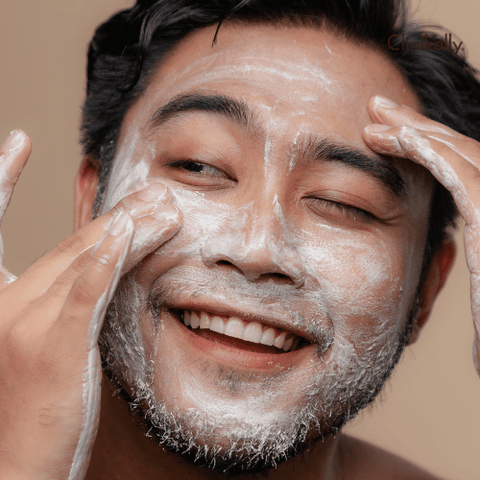
While soap-based cleansers have been the go-to option for many people for years, they can cause dryness, irritation, and acne breakouts on your skin. To select the best cleanser for your needs, you must first understand your skin type and pH balance. A consultation with a dermatologist can also be beneficial. Fortunately, there are plenty of kinder and more efficient face-cleansing options available, including cream cleansers made with natural ingredients, micellar water, cleansing oils, and cleansers made from cleansing butter. By choosing a cleanser that is suited to your skin type and concerns, you can support the maintenance of healthy, radiant skin while avoiding potential adverse effects.
































